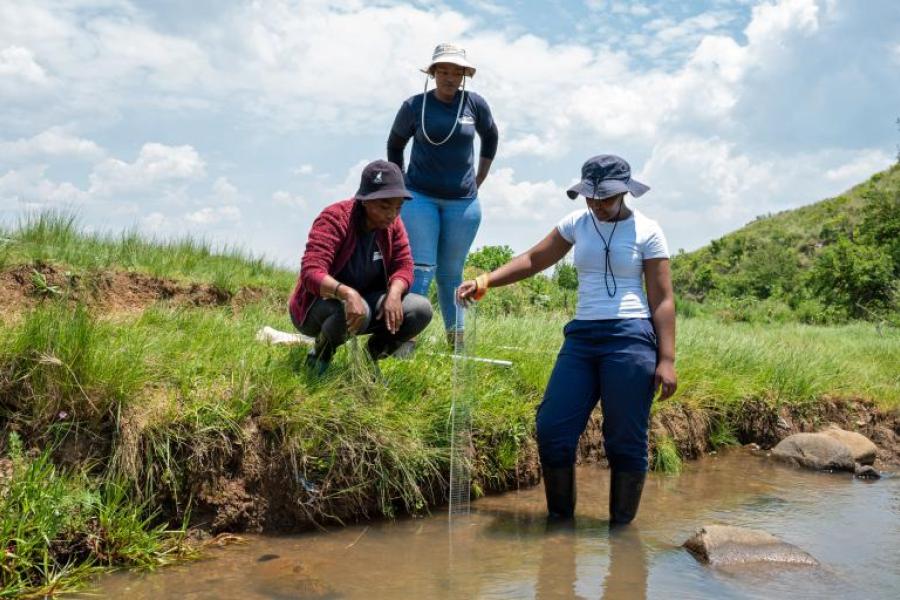Nearly 70 per cent of young people believe their actions can improve climate policies – UNICEF South Africa U-Report poll
04 September 2023
New poll findings highlight positive attitude among young people about their ability to influence climate policies to better protect and engage children, adolescents and youth in environmental and climate action.

PRETORIA, South Africa, 04 September 2023 – Children, adolescents and youth can influence climate and environmental policies, according to 70 per cent of young people who responded to the latest UNICEF South Africa U-Report poll.
Despite the optimism, the findings also revealed that 31 per cent of respondents still need more support to influence policies more effectively, while some 41 per cent said they haven’t received the training or developed the skills needed to respond to climate change and its related impacts.
The latest U-Report poll findings come as the Africa Climate Summit kicks off today in Nairobi, Kenya, following the Africa Youth Climate Assembly where young people presented their ideas, solutions and asks to put themselves at the heart of the global fight against climate change.
The poll results also follow the publication by the UN Committee on the Rights of the Child of ‘General Comment 26 on Children’s Rights and the Environment with a Special Focus on Climate Change’, which provides the first substantive guidance for States on what they must do to uphold children’s right to a clean, healthy, and sustainable environment. Thousands of children from across the world contributed their views and ideas to shape the document.
“Children, adolescents, and young people in South Africa are rightly not willing to be passive bystanders when their lives are already being impacted by climate change and environmental degradation,” said Christine Muhigana, UNICEF South Africa Representative.
“The future wellbeing of children and adolescents depends on commitments made by leaders today. Children and young people are determined to have their voices heard and acted on, so that their specific needs are included in environmental and climate policies and action,” added Muhigana.
The UNICEF South Africa U-Report poll also showed that 39 per cent of respondents learnt a lot about the climate crisis at school, while another 39 per cent stated that they didn’t learn enough and a further 13 per cent learnt nothing. Two thirds of those polled either agreed, or were not sure, when asked if their futures were at risk if they don’t learn about climate change and how to respond. Only one quarter did not agree with the necessity to improve knowledge and capacity to respond to climate related issues.
The Africa Climate Summit runs from 04 – 08 September with the theme ‘Driving green growth and finance solutions for Africa and the world’. UNICEF continues to advocate for child rights to be placed at the centre of climate action, including through:
- Prioritizing children and young people in climate financing and resource decisions - and securing climate finance that safeguards every child.
- Preventing the worsening of the crisis for children and young people by securing rapid emissions reduction (mitigation) and the transition to renewable energy.
- Protecting children and young people from the immediate impacts of the climate crisis by adapting child-critical social services and adopting climate resilient development policies.
- Preparing children for the impacts of climate change through climate education, green skills, meaningful participation.
UNICEF South Africa works to incorporate climate and environmental action and advocacy across its mandated areas of education, health and nutrition, water, sanitation, and hygiene (WASH), and child protection, including through:
- Supporting high-level Government interaction on climate resilient WASH solutions, such as the recent China – South Africa dialogue.
- Incorporating renewable and sustainable energy solutions into health systems, such as solar powered vaccine cold chain facilities.
- Promoting citizen science work that educates and engages adolescents and youth in community level environmental action, such as water monitoring.
- Scaling-up ‘Sport for Climate Change and the Environment’ programming where learners can engage in climate education, including through activities such as water sports to learn about and tackle environmental degradation.
- Establishing ‘Youth Reporters Groups’ working through schools and community radio to increase awareness about climate and environmental issues and to encourage community-level action.
- Encouraging and incentivizing environmental and climate action ideas and solutions presented by youth through online platforms such as the Youth Agency Marketplace (YOMA).
Notes to editors:
More than 6,000 U-Reporters participated in the U-Report climate poll, with 56 per cent of respondents aged between 15 and 30-years. Some 65 per cent of respondents were male and 35 per cent female.
U-Report is a platform managed by UNICEF South Africa to encourage youth participation and helps children and young people to have a voice on issues that matter to them and to access information, tools and services to influence positive social change.
The United Nations Committee on the Rights of the Child published ‘General Comment No. 26 (2023) on Children’s Rights and the Environment with a Special Focus on Climate Change’ on 28 August. This provides authoritative guidance to the 196 States that have ratified the UN Convention on the Rights of the Child on what they must do to uphold and protect children’s right to a clean, healthy and sustainable environment and explicitly affirms the obligations of each party under the UN Convention on the Rights of the Child (UNCRC).










